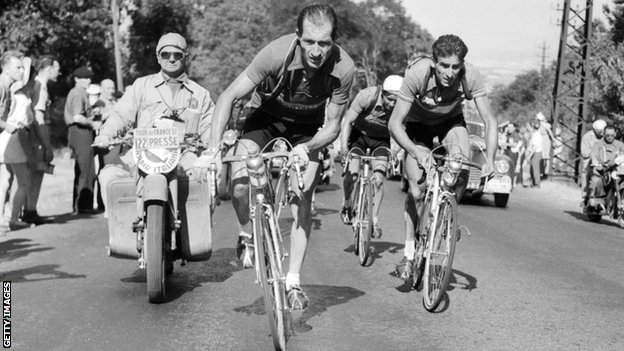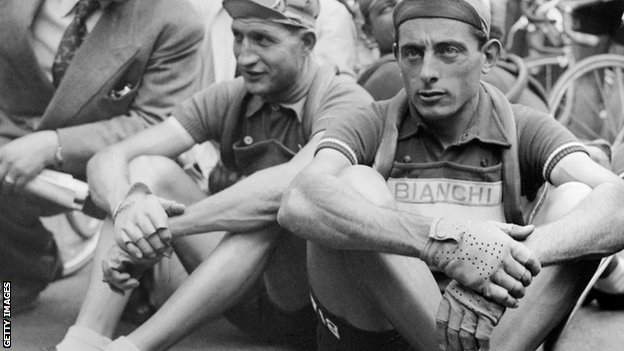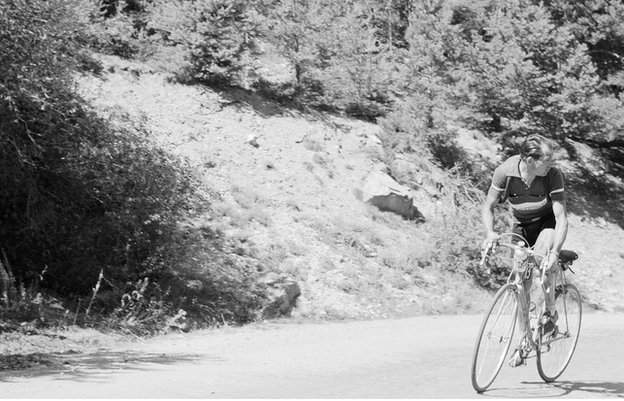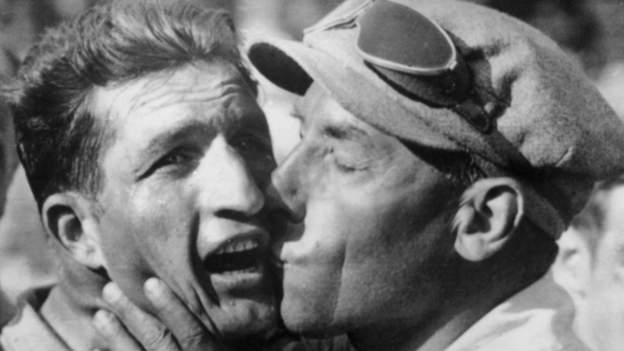By Niamh LewisBBC Sport
Last updated on .From the section Cycling

“I want to be remembered for my sporting achievements. Real heroes are others, those who have suffered in their soul, in their heart, in their spirit, in their mind, for their loved ones. Those are the real heroes. I’m just a cyclist.”
The world has been plunged into a pandemic. There are no sporting events for now, and governing bodies are working tirelessly to find a new time to get the show on the road – as our key workers battle to help saves lives.
Everyone else, athletes and non-athletes alike, have found themselves with time on their hands…
On this day 20 years ago, the iconic Italian cyclist Gino Bartali died of a heart attack. Nearly 80 years ago, the three-time Giro d’Italia and two-time Tour de France champion, too, found himself with time on his hands after cycling’s biggest events were interrupted by the Second World War, leaving them on a five and seven year respective hiatus and robbing him of his best years in racing.
But instead, Bartali saved the lives of more than 800 people – information which only came to light in the years following his death. This is how he did it.

Keep your friends close, and your enemies closer
Bartali remains one of cycling’s most heroic riders, and was fabled to be the second most popular man at the time in Italy after Benito Mussolini, the leader of Italy’s fascist party, following his first Tour de France win in 1938 – although the two were quite dissimilar.
But it was a bad time to be a professional cyclist in the era of Mussolini, particularly one who doesn’t want to get involved with politics.
In the 1940 Giro d’Italia, the final one before a five-year hiatus, Bartali was introduced to a man who would become his fiercest rival, Fausto Coppi – a skinny 20-year-old who came from a family of farmers in rural northern Italy.
The rivalry began when Coppi was bumped from domestique duties to team leader after champion Bartali suffered with his injuries from a collision with a dog on stage two.
Coppi shocked the peloton by taking the Maglia Rosa (pink leader’s jersey) during his first grand tour. But the big mountains in the Dolomites were yet to come. On Stage 16 Bartali found Coppi on the side of the road suffering with stomach problems.
A humble Bartali coaxed him back on his bike, convincing his team-mate and rival to continue. Success. The pair motored through the Dolomites tearing up the unforgivable mountainous terrain and teamed up for the remainder of the race with Bartali taking two stage wins and the overall King of The Mountains jersey, easing Coppi to overall victory with a lead of two minutes and 40 seconds.
“Some medals are made to hang on the soul, not the jacket,” he once said, albeit in different circumstances – but it is a fitting sentiment to helping his rival and being graceful in defeat.

War horse
Coppi and many other riders had already been called up for national service, but were allowed time away to compete in the few events which continued through the war.
Bartali who was a devout Christian, continued his long training rides, bordering on daily audaxes around northern Italy. Later he was given a job to do by the Cardinal of Florence, the Archbishop Elia Dalla Costa.
Until 1943 Italy was a safe place for jewish people, until the Nazis began operating in northern Italy and sending them and those who fought against the regime to concentration camps. Bartali joined the underground Assisi Network run by the Catholic church, which protected those at risk.
On his long training rides he would deliver false identity documents in the handlebars and seatpost of his bike to families across Italy from a secret printing press, enabling them to escape their fate, in turn saving the lives of at least 800 people.
